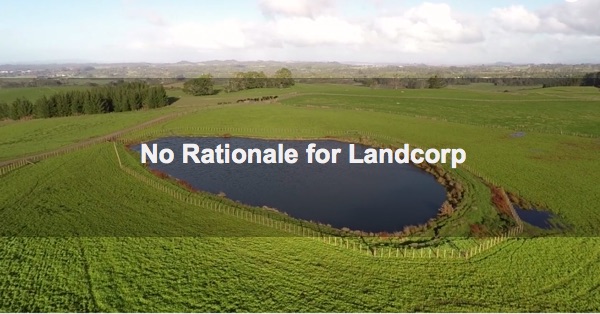After the downfall of Solid Energy, we have seen increased scrutiny of Landcorp – another State Owned Enterprise (SOE) that has recently taken on more debt. This debt has been taken on to fund large scale conversions of pine to pasture. We commented earlier this week on the environmental and treaty implications of these conversions and now other Waikato farmers have joined the calls for the conversions to be halted. In light of the drop in milk prices Landcorp’s plans look increasingly vulnerable, and that may force the SOE to sell some of its land. But the real question is why does Landcorp exist at all?
Why do we have Landcorp?
Landcorp was set up in the 1980s to manage the commercial interests of the Department of Lands and Survey. In these early days the task was mostly to run the high country leasehold farms that the government owned. One of the original rationale for keeping the land in government hands was that it could be used for Treaty settlements. In the mean time, Landcorp’s job was to use the land productively.
However, over the years the activities of Landcorp have grown and grown into a multi-headed monster. In addition to this original role it now converts land from pine to pasture, leases land for dairy, sheep, deer and beef farming and develops rural land for ‘higher value uses’. These are all activities that the private sector is adept at – there is no need for the government to be involved.
According to their website:
Our purpose is clear – to transform New Zealand farming. We understand the privileged nature of what we do and where we farm. Landcorp has long been New Zealand’s largest farmer – but we must also be its best.
We have extraordinary assets in our people, land and resources. We will continue to unlock and develop their potential while demonstrating that improvements in profitability can go hand in hand with sound environmental practices.
Landcorp is highly experienced in large scale farming operations and we’ll continue to utilise our skills and brand to target premium, niche markets around the world. We’ll stay lean and agile with a clear vision and robust strategies – because we know that what we have here is precious, valued and cannot be replicated.
This is mostly waffle – there is nothing here that the private sector can’t and shouldn’t do. In fact as we pointed out in our earlier blog, by the government owning this business it actually acts against them getting tough on environmental issues because it impacts on their own bottom line.
Where is the market failure?
Usually governments get involved with an industry or business for a precise reason. This is usually based on a ‘failure’ in the market – there is some reason we can’t leave it to private businesses to deliver. Healthcare is a good example – often people don’t make rational decisions about what healthcare they need. As we see in the US private model people tend to underinvest in prevention and pay through the nose for excessive treatments they don’t need, just because a doctor tells them they should.
So how does this idea of market failure apply to Landcorp? Short answer is, it doesn’t.
Farming is one of our most competitive industries, one where we can with a lot of confidence say the ‘market works’. Why then is Landcorp – a government-owned Quango out there buying, selling and leasing farms and doing stuff the market can do? It’s actually worse than that – to the extent Landcorp has an impact in the market for farms it’s crowding out the private sector, crowding out the activity of arguably our most entrepreneurial sector. It just doesn’t make sense – the government needs to get rid of it.
I can remember ten years ago asking senior Landcorp executives what on earth the rationale for their empire was. They told me it was a proven exemplar of best farming practice and provided much valued new knowledge for the farming industry. I thought that was a stretch at the time, and sounded more like someone trying to justify their job. But there can be little doubt that Landcorp’s expansion over the years has done little but stolen opportunity from the private sector and the justification for that is pretty well wafer thin. Now it threatens the Crown’s balance sheet and our ability to legislate on environmental bottom lines into the bargain.
How can we get out of it?
With the last of the Treaty settlements now being completed, it is time for Government to work out an exit strategy for Landcorp. As Fran O’Sullivan points out there are several options, such as doing a partial privatization deal with iwi or the NZ Super Fund. The Government could also transition its exit via the mixed ownership model that it uses on the electricity companies and Air New Zealand.
But whatever the route it needs to stop unnecessary interference in the market. We have enough instances of market dysfunction to justify government regulatory or ownership interference without doing it for no more than legacy reasons. That a National government is asleep to economically inefficient nationalisation like this seems particularly lazy – especially when it has conducted some quite questionable part privatisations of businesses where it looks like the market isn’t working properly (such as the electricity generators). What is it with this farming monolith for National? Smacks of some pretty weird double standards.

